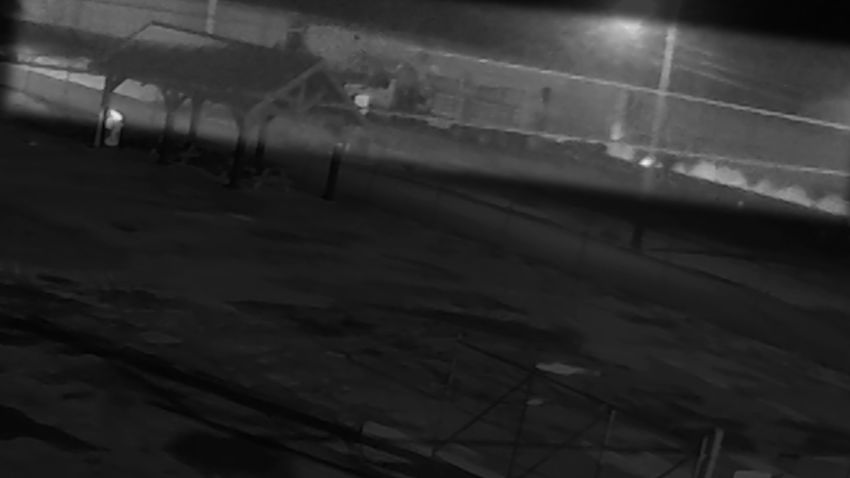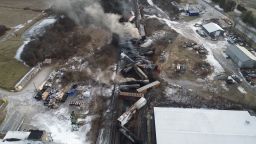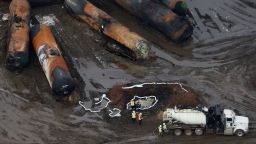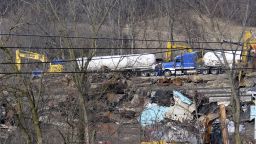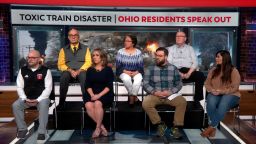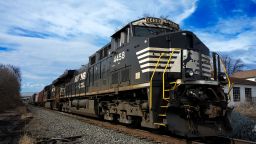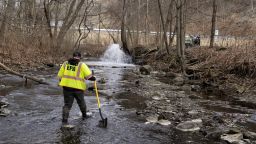Federal investigators released a spate of new details Thursday about the fiery train derailment that spewed toxic chemicals and wreaked havoc in East Palestine, Ohio.
The initial fire started February 3 when a Norfolk Southern rail car carrying plastic pellets was heated by a hot axle, said Jennifer Homendy, chair of the National Transportation Safety Board.
The temperature of the bearing increased as the train passed two wayside defect detectors – but it wasn’t high enough to trigger an audible alarm message until it passed a third detector, Homendy said.
She said the threshold for those detectors is set by the railroad. Investigators have not identified any track defects nor issues with the wayside defect detectors, Homendy said.
But “had there been a detector earlier … that derailment may not have occurred,” Homendy said.
The NTSB will investigate Norfolk Southern’s use of wayside defect detectors, including the spacing of the detectors and set temperature thresholds, she added.
A total of 38 train cars derailed in East Palestine, near the Ohio-Pennsylvania border. They included “11 tank cars carrying hazardous materials that subsequently ignited, fueling fires” that damaged a dozen cars that didn’t derail, the NTSB said in a preliminary report Thursday.
Five of those derailed train cars were carrying 115,580 gallons of vinyl chloride, according to the report. Vinyl chloride can increase the risk of cancer and is highly flammable.
Those five cars “continued to concern authorities because the temperature inside one tank car was still rising,” indicating a polymerization reaction which could result in an explosion, the report said. To help prevent a deadly explosion of vinyl chloride, crews released the toxic chemical into a trench and burned it off three days after the derailment.
The new revelations came after residents who have reported health problems since the toxic train wreck lambasted Norfolk Southern’s CEO and after calls for Norfolk Southern to buy the homes of residents who don’t feel safe.
NTSB chair: Derailment was ’100% preventable’
Among the other details in the NTSB’s initial report:
• While no cause of the derailment has been released, investigators are focusing on one car’s wheel set and bearing. Video of the train before the derailment showed what appeared to be an overheated wheel bearing, the report said. Footage showed sparks flying from underneath the train. Investigators are looking into what may have caused the overheating, Homendy told CNN’s Jake Tapper Thursday evening.
• One wheel bearing’s temperature reached a “critical” level – 253 degrees Fahrenheit above the ambient temperature – and prompted an audible alarm that instructed “the crew to slow and stop the train to inspect a hot axle,” the report says.
• The train’s engineer applied the train’s brakes and additional braking after the alert of an overheating axle, the reports states.
The derailment was “100% preventable,” Homendy said. “We call things accidents – there is no accident. Every single event that we investigate is preventable.”
But she said there is no evidence the train’s crew “did anything wrong.”
The engineer was already braking to slow down behind another train. So when the alarm sounded, he responded “immediately” and increased the brake application, Homendy said.
“During this deceleration, the wheel bearing failed,” she said. “Car 23 derailed, and the train initiated an emergency brake application and came to a stop.”
Homendy later told CNN it’s still “too early to tell” what would have helped prevent the disaster.
“It could be regulation changes. It could be recommendations to Norfolk Southern, to the Department of Transportation or to rail car manufacturers or to emergency responders. But again, it’s too early to tell,” Homendy told Tapper, highlighting that NTSB does not have regulatory authority and can only issue safety recommendations.
Shortly before the NTSB released the new details, members of the agency met with US Transportation Secretary Pete Buttigieg as he toured East Palestine for the first time since the disaster.
Buttigieg on Thursday called for expanding regulations around trains like the one that derailed, and said the railroad industry “should be doing more” to implement higher safety standards.
“Hazardous materials could be going through communities in stronger tank cars,” he added.
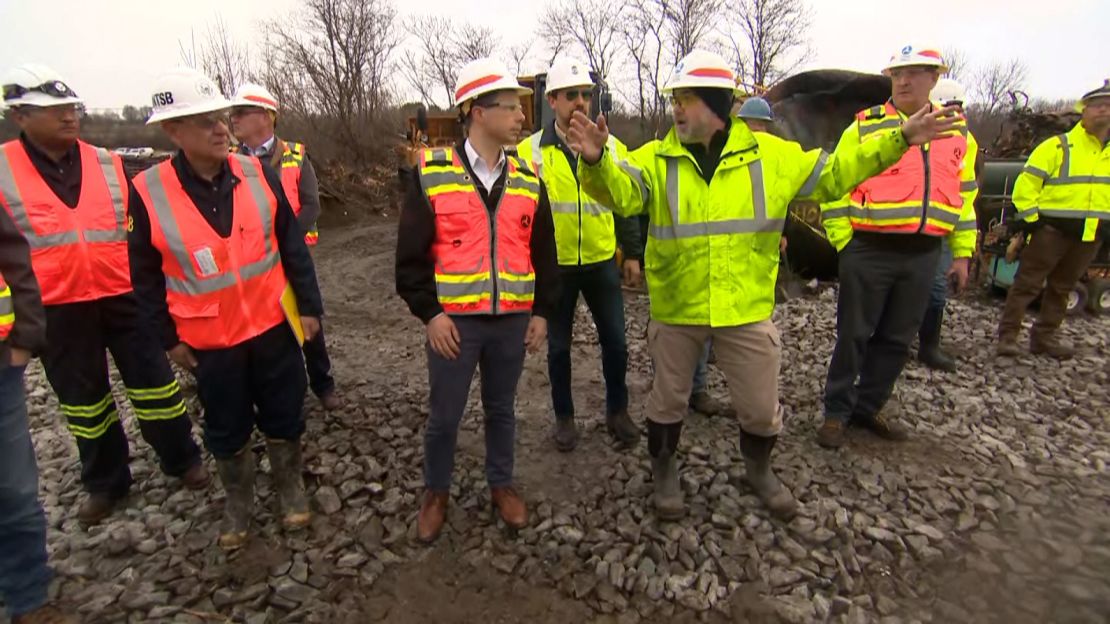
Norfolk Southern should consider buying worried residents’ homes, official says
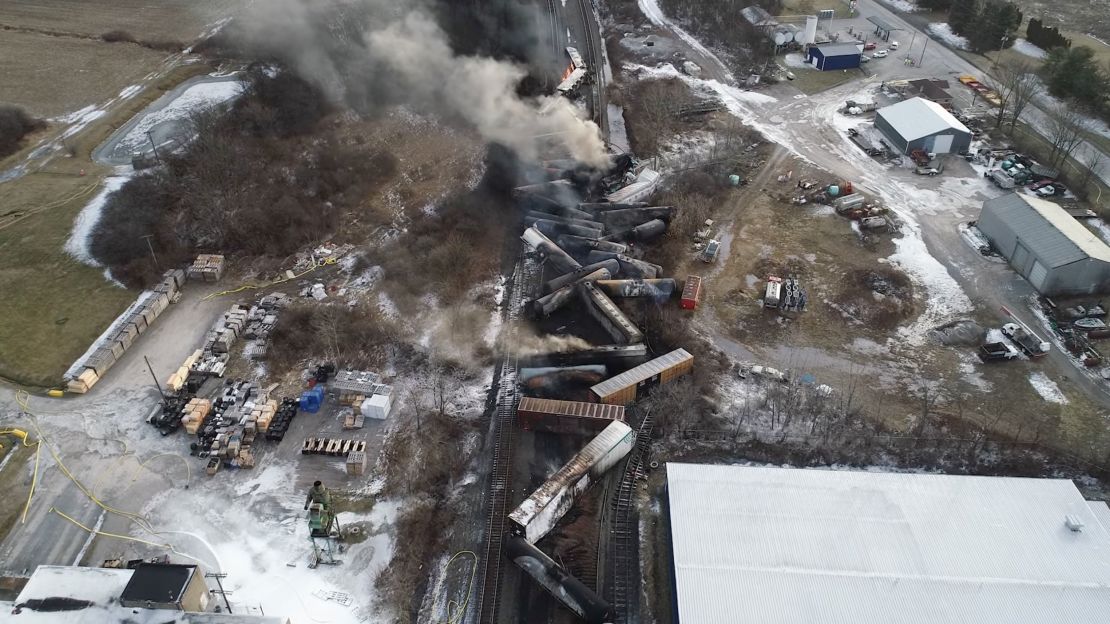
Some waterways in the area were contaminated after the derailment – killing more than 40,000 fish and other aquatic life – but officials said those contaminants have been contained.
And Ohio authorities have repeatedly said air quality and municipal water tests in East Palestine show no dangerous levels of chemicals.
But residents worry about potential health effects, and some have reported bloody noses, burning throats, nausea, headaches and vomiting since the toxic wreck.
Ohio Lt. Gov. Jon Husted said Norfolk Southern – which reported a record-setting operating profit of $4.8 billion last year – “should consider buying property of people who may not feel safe or would want to relocate as a result of the spill.”
Husted told CNN Thursday that findings from the NTSB investigation “could be the basis for a criminal referral.”
Across the border in Pennsylvania – where some residents were also ordered to evacuate – the state attorney general’s office is already looking into a criminal referral against Norfolk Southern, at the request of state environmental officials.
Norfolk Southern spokesperson Katie Byrd declined to comment specifically on the criminal referral.
“I think our actions to work with local, state, and federal leaders from the beginning, support the community, and lead on environmental remediation speak for themselves for the moment,” Byrd told CNN in an email.
‘Did you shorten my life?’
East Palestine residents – including some who have reported health problems since the disaster – vented their frustration at government officials and Norfolk Southern during a CNN town hall Wednesday night.
“Did you shorten my life now? I want to retire and enjoy it. How are we going to enjoy it? You burned me,” resident Jim Stewart told Norfolk Southern CEO Alan Shaw.
Stewart, who has lived in East Palestine for more than six decades, said the wreck torched his dreams of retiring soon and selling his house. He said he worries about the home’s value now and is afraid to take his dog out because of a strong stench lingering in the air, noting he’s been coughing daily.
“Do I mow the grass? Can I plant tomatoes next summer? What can I do?” Stewart said.
Resident Josh Hickman said he was among those who experienced headaches, dizziness and blood from his nose while in the village. He went to the emergency room for treatment on Tuesday, he said.
In addition to vinyl chloride, chemicals of concern at the site include those released when vinyl chloride breaks down, according to the EPA.
During the town hall, Ohio’s governor stressed he did not want to minimize any medical issues potentially linked to the derailment, saying that’s the reason he requested medical experts to the community.
Medical teams from the US Centers for Diseases Control and Prevention and the US Department of Health and Human Services will be on the ground this week at Gov. Mike DeWine’s request. The state also opened a health assessment clinic for residents who worry their symptoms could be linked to the wreck.
What Norfolk Southern is now required to do
Despite repeated questions from frustrated residents, Shaw declined to answer questions regarding the wreck, saying he was “prohibited” from talking about the probe.
“I’m terribly sorry that this has happened to this community,” he said.
“We’re going to get the cleanup right, we’re going to reimburse the citizens, we’re going to invest in the long term health of this community,” Shaw said. “I’m going to see this through, and we’re going to be here.”
Norfolk Southern has been ordered by the EPA to fully clean up the wreck – or face expensive consequences.
According to EPA administrator Michael Regan, Norfolk Southern will be required to:
- provide a descriptive work plan on how they plan to clean up the water, soil and debris,
- reimburse the EPA for providing residents a cleaning service of their homes and businesses,
- show up to public meetings and explain their progress.
If the company does not follow the order, the EPA will step in to complete the duties, while fining Norfolk Southern up to $70,000 a day, Regan said during the town hall.
“And the law gives us the authority to charge Norfolk Southern up to three times the amount that the cleanup will cost us,” he said.
As cleanup continues, residents remain skeptical
The ongoing cleanup efforts at the derailment site include removing contaminated soil and water from under the railroad tracks.
Contaminated soil became a point of contention last week after a public document sent to the EPA on February 10 did not list soil removal among completed cleanup activities. It is not yet known what significance or impact the soil that was not removed before the railroad reopened on February 8 will have had on the surrounding areas.
DeWine said 4,588 cubic yards of soil and 1.1 million gallons of contaminated water have been removed so far from East Palestine. The railroad tracks will also be taken up so that the soil can be removed, the governor said.
The governor said officials will continue testing the municipal water weekly to ensure it remains clean, and at least 74 private wells have also been tested, with results pending. Residents with private wells should continue drinking bottled water until they receive their test results, DeWine said.
But some residents remain hesitant to believe what they’ve been told.
“I’m still not using the water,” resident Nene Stewart said during the town hall. “I use bottled water. I can’t. I’m not trusting what they’re saying. I don’t know who’s telling the truth.”
CNN’s Ross Levitt, Gregory Wallace, Pete Muntean, Kristina Sgueglia, Paul P. Murphy and Chris Isidore contributed to this report.


